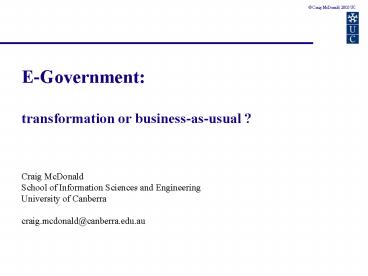INFS2024 PowerPoint PPT Presentation
1 / 14
Title: INFS2024
1
E-Government transformation or
business-as-usual ? Craig McDonald School of
Information Sciences and Engineering University
of Canberra craig.mcdonald_at_canberra.edu.au
2
Transformation
Transformation is foremost a continuing process
that does not have an end point. It is meant to
create or anticipate the future. Transformation
is meant to deal with the co-evolution of
concepts, processes, organizations and
technology. Change in any one of these areas
necessitates change in all. Transformation is
meant to create new competitive areas and new
competencies. It is meant to identify, leverage
and even create new underlying principles for the
way things are done. Transformation is meant to
identify and leverage new sources of power. The
overall objective of these changes is simply
sustained American competitive advantage
in warfare. http//www.defe
nselink.mil/transformation/about_transformation.ht
ml
3
This seminar takes an ICT / Informatics View
Informatics - The study of Nature of
information (incl. data and represented
knowledge) The creation of information
artefacts and systems The disciplined and
responsible intervention in organisations Based
in Theory (Information, Systems,
Knowledge) Research (Applied) Technological
Innovation, organisational change Core
Practice Systems conception, construction,
implementation and management Scope
includes Information Systems (TP MIS, DSS
KBS) Information Management (document
management IR) Workflow specialist
systems (eg. GIS, simulations) Strategic,
project operational management
4
ICT / Informatics Disciplines
Informatics
ICT
5
ICT Government Two Cultures
Government
ICT/Informatics
6
Levels of e-Government Transformation
Surface Intermediate Deep
7
Transformation 1 Surface
- Aims at improved efficiency and effectiveness of
agencies in carrying out their programs - Raises questions about methods and processes.
- From last weeks discussion
- Information provision (web pages
- Download / upload communication (e-Tax)
- Transactions (Archives purchase)
- Identity required systems (GAMS)
- Drivers
- Technology Push
- Career advancement of decision makers ?
8
Architectures for Surface Transformation
9
Surface Transformation Impacts
Personal (Actor) Level
Job - loss or gain Changes to skills
requirements Responsibility - for things that the
person can no longer control Techno-Stress
impacts on health relationships Autonomy in the
workplace Social interaction Political role
status Efficiency, effectiveness
productivity evaluation Alignment Organisational
structure work transfer eg. user-pays (ATM,
students) Lifetime costing - support
maintenance (shelfware) Benefits Niche
demographic
Organisation Level
Social Level
10
Transformation 2 Intermediate
Intermediate Transformation questions
institutional structures. Questions a seamless,
homogenous, whole-of-government, inter-operating,
administratively neat APS. Different agencies
interact in different ways with the same set of
stakeholders (be it a person, an organisation or
a group of organisations, or state or local
governments). Acts of parliament and the
regulations made under them define the
conceptualisations and organisational structures
that make up the APS knowledge base, institutions
technology, rather than stakeholders
11
Transformation 2 Architecture
Stakeholder-oriented Architecture Each entity
such as a citizen or firm has an avatar which
participates as a surrogate for the entity in
dealing with requests from other agents (for
example, the tax agent asking for information
about income and deductions) and initiating
requests for information or action (eg. customs
agents, disability service providers,
etc) Agent-oriented Architecture
12
Transformation 3 Deep
Deep transformation questions the agency of
stakeholders in the role and scope of government
itself. Systems can be constructed which would
allow genuine transparency of government activity
and actual collaborative stakeholder policy
development, implementation and evaluation.
The technology exists to support a high degree of
transparency in government activity, but that
capability will only be utilised in a 'freedom of
information' context, not under a 'need to know'
regime.
13
Transformation 3 Deep
Underlying each new Act there is a set of views
that the government of the day holds. These views
include its perception of the nature of our
nation, the philosophical role government plays,
the kinds of policies it wants to pursue and the
specific changes the government wants to see come
about. Facets of the dialogue are addressed
differently by multiple laws leading to systems
that are deeply incompatible. As the concept of
Knowledge Management Systems develops, ways of
representing political conceptualisations can be
brought together with societal data and
information to produce a firmer, public
foundation for policy development and
implementation.
14
Conclusion
e-Government is at a superficial level of
transformation, largely doing business-as-usual.
Whether there can be intermediate
transformation structural change or deep
transformation nature of government remains to
be seen. But technology and systems are
emerging that can make these transformations
possible.

